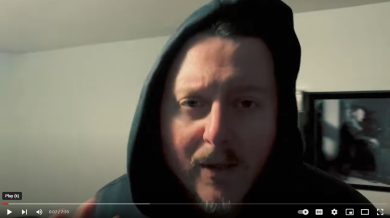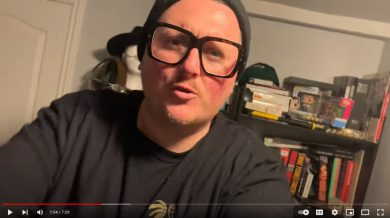Eight years is an eternity in hip-hop. It’s even longer in Canadian hip-hop. And yet D-Sisive, a self-identified “43-year-old Canadian dad,” is on a quest to become “the most famous-est rapper in the world.” If that wasn’t audacious enough, the artist born Derek Christoff claims he can do it in three months’ time.
Never mind that Christoff announced that goal… three months ago. The point, for the Polaris-longlisted and JUNO-nominated rapper, was to set a goal that could kickstart the creativity of an artist who once dropped two albums a year between 2008 and 2014. In 2009, he won SOCAN’s Echo Songwriting Prize (now without the “Echo” in its name) for his song “Nobody With a Notepad,” co-written with Rob “Muneshine” Bakker, from a shortlist that included Joel Plaskett, Land of Talk, and Timber Timbre. He’s likely the only rapper to have had both Ron Sexsmith and Fucked Up’s Damian Abraham guest on his records. Now D-Sisive is on track to release two EPs a month, while posting podcasts and vlogs, and hosting monthly Zoom listening sessions with fans, all part of a subscription project he calls Knoblich Gardens.
Despite his bold, WWE-kayfabe-style boasts, Christoff is realistic. “Music has changed completely in the last eight years,” he says. “At my peak, I was in the conversation: not that it means anything, but I was in the CBC lists and Vice articles about Canadian rap. Now: it’s like I was never there. Everything is different: from the sound of the music, to sub-genres of hip-hop, even down to people who work in the industry. I feel like a brand-new artist starting at zero.”
He’s taken an extended break before. An acclaimed battle rapper in the late ’90s, he laid low for six years while battling depression. When he returned in 2008, it coincided with a slowly evolving addiction to Percocets, which he’d been prescribed after a brutal bout with mononucleosis in 2005. The son of an alcoholic, he didn’t drink or do any kind of drugs before then, not even painkillers. Like many people, he didn’t realize that Percocets are not unlike synthetic heroin. He soon learned that his siblings were also using, and he now had access to a cheap, steady supply.
“You’d think my siblings would try and talk me out of it, but it turned into an enabling situation,” says Christoff. “I could have said no. But my life was turning dark. My dad was getting sicker, his addiction was getting worse, and these pills became an escape for me. Things slowly progressed. It wasn’t like I dove in really quick.”
The addiction and other life events caught up to him after 2014’s Raging Bull EP. He checked into rehab in 2017 and was determined to start recording again. His doctor advised him to slow down, and not risk a relapse. Instead, Christoff took a factory job with a 5:00 a.m. shift and focused on family life as the father of three daughters. It wasn’t until October of 2022, during a weekend getaway with his wife, that she advised him to put up or shut up: “I don’t want to hear your ideas anymore!” she told him. “I want to hear you rap.” Two days later, he posted a video to social media announcing the ambition of the Knoblich Gardens project. Fifteen minutes later he got a message from Muneshine, his longtime collaborator. “So, uh, yeah, I just saw your post. You’re fucking insane. But let’s do this.” Three weeks later, the first EP dropped.
Around that time, he posted a before-and-after picture on Instagram: on the left, he was a drug-addled disaster from years past; on the right, he was clean, had lost weight, and was the proud father of twins. He then got a DM from a fan, whom he’d met on University Avenue in Toronto the day he checked himself into rehab in 2017. The fan wrote, “Your music helped me get through dark times and shitty moments in my life. I’d always wanted to meet you. As we were exchanging words on the street that day, all I could think was, ‘I don’t think he’s going to live much longer.’ I wanted so badly to take a picture with you, but I couldn’t do it, because I didn’t want that to be the last memory of someone I admired so much.”
Now that he’s back in the game, he’s heard his share of naysaying. “I have friends who say, ‘No one wants to hear someone rap at your age.’ And I’m, like, ‘Where is that proven?’” He cites the third-act career of El-P, the 48-year-old who now headlines arenas as half of Run the Jewels. “El-P has proven that age doesn’t matter, as long as you make amazing shit that people can relate to. Maybe young kids don’t want to hear old rappers if they’re not delivering anything they want to hear.”
Despite likely industry perception, there’s an audience of older hip-hop fans who appreciate someone with life experience: 43-year-old rap fans exist, so why can’t a 43-year-old rapper succeed? “I don’t know who created this narrative that you turn 40 and you don’t listen to music anymore, you just sit in silence and stare at the wall all day,” says Christoff. “I also have 23-year-old people who listen to me, and I know that because I get messages from them – but they have to go digging to find me.”
On one of his recent podcasts, Christoff said, “I haven’t made so many mistakes – I’ve made every mistake.” Asked about that directly, he laughs and says, “That’s my life. That will be on my tombstone. As long as you learn from those mistakes, and don’t make them again.”

